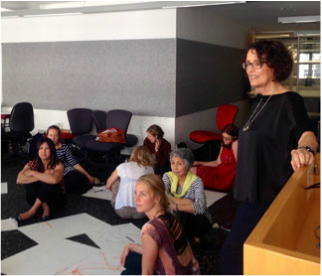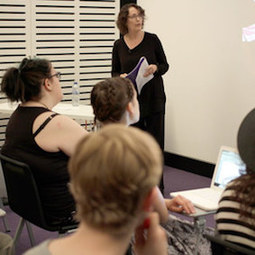Education
An Introduction to Contemplative Education

Contemplative Education involves the integration of contemplative practices, philosophies and orientations into all educational settings, at every level, to support the development of the whole student and teacher. It does this by helping them engage their first-person or subjective knowing (which includes heightened somatic or bodily awareness), the second or intersubjective, and third-person, or objective, cognitive knowing. Contemplative Education spans disciplinary boundaries, all stages, and formal and informal settings. In general it is incorporated in three ways, a) remedially, to address stress, anxiety and depression, and to heighten focus, b) the physiological, psychological and philosophical foundations of the practices are taught, and c) a contemplative orientation is fostered in individual classes or across institutions. These three approaches can be used separately or integrated in a course of study or the development of an institution wide contemplative orientation.
I engage my understandings of these aspects of Contemplative Education and my experience as a teacher, researcher, artist, community developer and academic to provide a range of contemplative education services. These include: mentoring, teaching, lecturing, workshops and curriculum development in Contemplative Education, and the design of appropriate methods to develop and initiate an institution wide contemplative orientation. To discuss further please contact me.
I engage my understandings of these aspects of Contemplative Education and my experience as a teacher, researcher, artist, community developer and academic to provide a range of contemplative education services. These include: mentoring, teaching, lecturing, workshops and curriculum development in Contemplative Education, and the design of appropriate methods to develop and initiate an institution wide contemplative orientation. To discuss further please contact me.
|
A defining characteristic of Contemplative Education is its diversity: in the origins of its experiential practices, the disciplines that engage it and the methods that contemplative pedagogues use.
Read more... |
In this section I briefly outline the benefits of contemplative practice in education as they relate to neuroscience, psychology and meditation research.
Read more... |
In this last section I offer 4 insights about Contemplative Education that I have gained over the past 7 years of my research in this area. They are important to consider when developing sound contemplative education initiatives
Read more... |
Incorporating Contemplative Practices
Why incorporate Contemplative Practices into Education?
There are two central reasons to engage Contemplative Education:
Both are exacerbated by the constant connectivity provided by Information Communication Technology (ICT) and the economic rationalism underpinning many educational sectors. A recent survey of Australian workers (WHAA, 2015) shows that 65% suffer problems with stress, while research conducted in 2013 at the University of New South Wales (UNSW) found that 52% of UNSW students suffered stress and anxiety (CAPS, UNSW, 2013). Neuroscience, psychology and meditation research suggests that contemplative practice can ameliorate some of the issues arising from the accelerating pace of life, problems such as fragmented attention, low emotional intelligence, lack of moral and ethical awareness, and disengagement from meaningful human contact. Contemplative Education is not a cure all but it can help with these problems particularly if a whole of institution approach is taken, including the provision of training in contemplative practice for students, academics and staff.
There are two central reasons to engage Contemplative Education:
- Firstly, it helps remediate the increasing levels of stress anxiety and depression and time poverty, and constant partial or fragmented attention that students and educators are currently battling.
- Secondly, it supports the development of prosociality, interpersonal and emotional intelligence; and the soft skills increasingly sought by employers who require graduates with the sophisticated communication skills crucial in the navigation of global business networks.
Both are exacerbated by the constant connectivity provided by Information Communication Technology (ICT) and the economic rationalism underpinning many educational sectors. A recent survey of Australian workers (WHAA, 2015) shows that 65% suffer problems with stress, while research conducted in 2013 at the University of New South Wales (UNSW) found that 52% of UNSW students suffered stress and anxiety (CAPS, UNSW, 2013). Neuroscience, psychology and meditation research suggests that contemplative practice can ameliorate some of the issues arising from the accelerating pace of life, problems such as fragmented attention, low emotional intelligence, lack of moral and ethical awareness, and disengagement from meaningful human contact. Contemplative Education is not a cure all but it can help with these problems particularly if a whole of institution approach is taken, including the provision of training in contemplative practice for students, academics and staff.
If you would like to discuss these matters further or contract me to design a contemplative orientation for your organisation, or design and facilitate contemplative courses, curriculum, teaching, research or workshop presentations please contact me here
Why incorporate contemplative practicesStress is becoming a major concern as the pace of life continues to accelerate augmented by the constant connectivity provided by ICT. The Workplace Health Association of Australia’s (WHAA’s) 2015 report on the Australian workforce has shown that 65% of employees reported moderate to high stress levels, with 41% having psychological distre Read more...
|
Accelerating
|
Issues teachers and students are facingThe benefits of contemplative practice such as heighten metacognition, increased ability to retain and retrieve information and other positive skills associated with increased ability to focus (or single task) and the stronger executive functions that can result from contemplation are increasingly being sought by teachers Read more...
|








